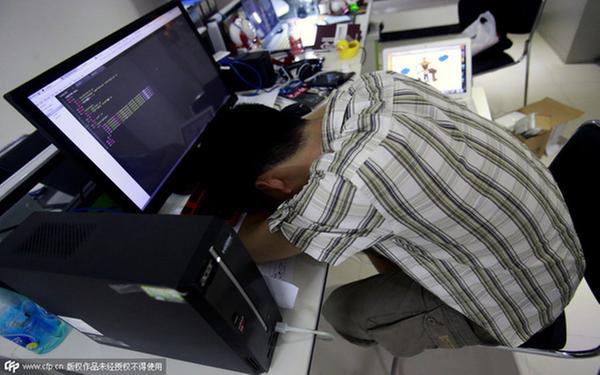Workers deserve due overtime pay
By Qiao Xinsheng | China Daily | Updated: 2017-05-03 07:21
 |
| A software developer takes a break in his office in Wuhan, Central China's Hubei province, April 28, 2015. [Photo/CFP] |
Many laborers work overtime during holidays, even on the International Workers' Day, but a majority of them are not paid the stipulated amount for the extra work they do. Article 44 of the Labor Law says the remuneration for overtime work should be higher than that for work done during normal working hours. If laborers are made to work on rest days and no deferred rest days are offered, the employer has to pay no less than 200 percent of the normal wages to them. And if overtime work is arranged on statutory holidays, the employer has to pay at least 300 percent of the normal wages to the workers.
Article 31 of the Labor Contract Law says the employing unit should pay laborers for overtime work according to the country's laws and regulations, which have been enacted to protect workers' rights and interests and ensure they get the mandatory number of rest days and holidays.
But since workers can hardly safeguard their rights and interests, many employers continue to violate the laws and regulations. Very few laborers use labor arbitration or labor contract litigation to protect their rights and interests, and the ultimate result for those who do so is almost always the same: loss of their jobs.
The legislature seems to have overlooked the unequal status of laborers and employing units, as well as the difficulties workers face if they use legal means to protect their rights and interests. Actually, without the support or assistance from a third party, most workers cannot use any legal means to protect themselves.
It's time the legislature realized the labor contract is based on an unequal relationship, while the Labor Law is to protect the disadvantaged group, the laborers. Legislators should, therefore, consider strictly implementing the labor contract to make a feasible operating procedure so that all parties to the contract fulfill their obligations. And to ensure this happens, the human resources and social security authorities should be given more power and responsibilities.
Besides, to enhance the government's responsibilities vis-a-vis supervision, the Labor Law should make it mandatory for the labor contracts between employing units and the workers to be registered with local human resources and social security authorities through their websites. In case any labor contract is changed, the employing units should inform the local human resources and social security authorities in the same way. Also, the local authorities should regularly and strictly monitor the employing units' overtime and wage payment records to protect workers' rights and interests and prevent employing units from forcing the laborers to work overtime or deducting the wages or remunerations they deserve.
Since workers are most likely to be at a disadvantage if they use legal means to protect their rights and interests, it is up to the human resources and social security authorities to take effective measures to help them. The authorities, for example, can trace relevant information through the electronic filing system for labor contracts and wage payment situations as long as the laborers complain to them. They can also require the employing units to get their acts together in order to protect workers' rights and interests.
The Labor Law and Labor Contract Law both emphasize the significance of workers, and stipulate a series of rights and interests, and relief measures for their protection. But unless the human resources and social security authorities are given more power and responsibilities, one cannot expect workers' rights and interests to be fully protected.
The legislature therefore should take steps to enhance the legal responsibilities of the human resources and social security authorities to protect workers' rights and interests.
The author is a professor of Zhongnan University of Economics and Law.
























